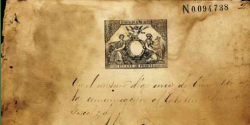
LAMP, formerly the Latin American Microform Project, has supported the digitization of approximately 5,000 documents dated between 1844 and 1900. These consist of legal court cases, mostly civil, from the Corte de Primera Instancia (Apellate Court) of the district of Arecibo, Puerto Rico. The University of Connecticut Thomas J. Dodd Research Center acquired these unique materials in 2000 about the Arecibo appellate court district, which includes the towns of Arecibo, Barceloneta, Camuy, Ciales, Hatillo, Manatí, Morovis, Quebradillas, and Utuado.
The cases cover the full range of civil litigation that might have been brought to court during that period. Cases about disputes over economic holdings such as land, slaves, and livestock hold special interest. The collection is also a treasure trove for genealogists, historians, legal researchers, and other social-sciences researchers interested in understanding Puerto Rico’s social dynamic during the 19th century.
In 2008, the University of Connecticut received an inquiry from the General Archives of Puerto Rico regarding this collection. The Archives believed that this collection belonged to one of two 19th-century archival fonds, from the Arecibo district under their custody. In addition, the General Archives believed that these records should be returned to Puerto Rico based upon Puerto Rican Law #5 of December 8, 1955, and its amendments, which established the General Archives and mandated that all Spanish colonial records be deposited at the General Archives. However, the Archives had neither the legal power nor proof to substantiate the claim that the records belonged to the Puerto Rican government. Therefore, they requested that the University of Connecticut photocopy the entire collection so that they could add it to their fonds to fill the gap in their incomplete Arecibo holdings.
The Connecticut archivists were initially inclined to return the collection to Puerto Rico; however, because the collection is the property of the University of Connecticut, the university required legal proof of prior ownership. As the Puerto Rican archives and government were unable to provide this proof, the Dodd Center could not return the collection. The center also could not photocopy the collection, as the extremely fragile paper had acute bleed-through of the oak gall ink used in its double-sided composition. The production of simple photocopies would have created unreadable results and would have damaged the paper and accelerated its deterioration. The only other option was to digitize the collection, which at the time Connecticut was unable to do. It lacked funds for staff and equipment to undertake a project that would require many hours to carefully digitize the fragile documents, followed by developing custom post-processing methods to manipulate the resulting images so that researchers could read them.
During the last three years, the University of Connecticut Libraries have developed an in-house digital conversion laboratory with new equipment and digital capture, and conversion workflows to handle a wide variety of materials. Confident in these new capabilities, the university sought funding from LAMP to digitize the collection of Puerto Rican court records. LAMP approved funding for this project at its meeting in Philadelphia in May 2011. With LAMP’s funding assistance, the University of Connecticut has scanned the collection, which is now openly accessible at http://archive.org/details/puertoricancivilcourtdocuments. The university’s finding aid for the collection is at http://doddcenter.uconn.edu/asc/findaids/PRCourt/MSS20000130.html.